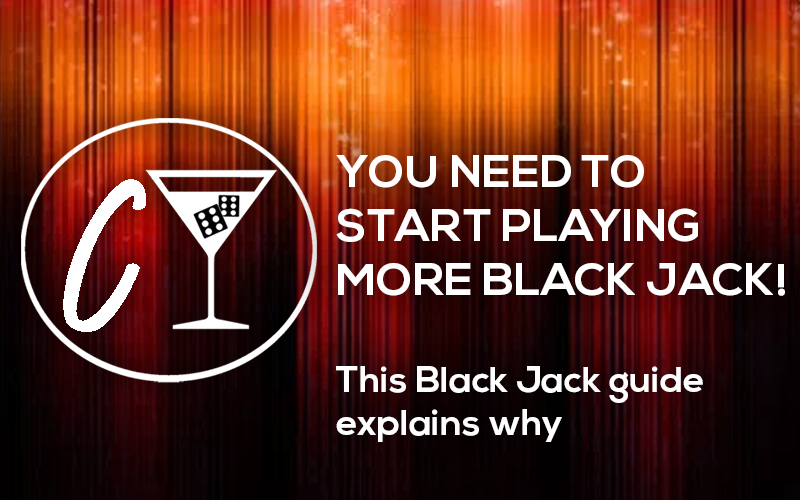You Need to Start Playing More Black Jack!


A Casino has an advantage over the player with merely 1 percent. Given the skill-based nature of Black Jack, the odds can even out more to the players favor by investing time to gather the knowledge necessary to be a skilled Black Jack player! This Black Jack guide will go over the fundamentals of Black Jack, how to go about the game in general as well as offer invaluable tips to increase your knowledge over this fun and popular card game.
Added is also a chart off suggested game-play as well as a Black Jack glossary for the unsullied.
Black Jack History
Where does the world famous Black Jack game come from and how long has it been played? The French often takes credit for the creating and commercializing game, since it has some similarities to the French game Baccarat. There is also a connection with the French game from the 1700 “Ving-et-un”, which practically means 21. The game rose in popularity as a substitute for Poker when it first became popular in the states. It became a separate game when the rules of poker slightly changed in some circumstances when you could, for example, claim bonuses just by receiving ace and jack of Spades – hence the name Black Jack.
How To Play Black Jack
This Black Jack Guide pretty much takes it from scratch. If you are well invested with the Black Jack game-play already, feel free to skip this part of the Black Jack Guide.
A game of Black Jack starts when all players place bets in order to receive two cards up front from the dealer, visible for everyone – even other participants. This is because all players that participate in a game of Black Jack plays individually against the “House” i.e the dealer. The dealer also gives itself two cards, where one of those is visible for everyone.
The goal is to not have a total value on your cards to exceeds 21. The way to go about counting the value is pretty much the easiest part of Black Jack. Every card from 2-10 has its displayed value and Jacks, Queens and Kings have the value of 10. The ace can have both the value of 1 and 11, depending on what you choose it to be. When it’s your turn, you ask for as many cards as you want in order to get as close to 21 as possible without exceeding it. When you have an amount that you are happy with (or if you exceeded 21, you’re out), it’s the next players turn to do the same.
When all players have gone through this process, the dealer also gets cards automatic until it either exceeds 21 (which means that all players that are still in the game win) or gets the total amount of 17-21.
Every player that has a total amount that is higher than the dealers you win as much as you wagered. If the amount is equal the wager goes back to the player. Also if a player gets 21 he receives 150% of the wagering amount instantly. If the dealer gets 21 however, everyone loses automatically.
It’s also possible for a player to “double down” its stakes before receiving another card or “split” the current cards if he has two cards with the same value – which also amounts in a double wager. It’s also possible for a player to receive an “insurance” when the dealer draws an ace as a first card. The one that chose to make an “insurance” doesn’t lose if the dealer gets 21 (Black Jack) or loses half the wager if the dealer doesn’t.
The Rules of Black Jack
Black Jack is played with a standard deck of cards with the Jokers removed, as most common card games are. This leaves 52 cards to be used. However, more than one deck can be used by the dealer – though the odds remains the same. Before the cards are handed out and the dealer has shuffled the cards, a selected player will be chosen to cut the cards with a plastic card, ending the shuffling with a last one, the player decided shuffle. This is done to show any player that no foul play is used or that the deck is rigged in any way.
A player may choose to play more than one hand at a time, given that there is room on the black jack table. One player can even play at every free slot on a Black Jack table. There is almost always a maximum and minimum bet limit with a 4:10 ratio. Once the bets are placed, the dealer makes sure no more bets can be placed. The cards are always dealt clockwise from the dealers left side. The dealer’s card is therefore placed last.
If a player wins a hand, he is paid out 1:1, ergo a 100% of the wagering. This can be modified depending on if the player chooses to “double down”, “split” or make an “insurance”. As mentioned, a Black Jack is paid with a 3:2 of the total wager.
A player that decides to “split” aces is usually only allowed to receive a single additional card on each played hand. Normally players are allowed to split two non-matching 10-value cards, for example, a king and a jack. If aces are split and the player draws ten or if tens are split and the player draws an ace, the resulting hand does not count as a Blackjack but only as an ordinary 21. In this case, the player’s two-card 21 will push (tie with) dealer’s 21 in three or more cards.
When it’s the dealers turn to decide whether to pass or play, it’s all done after set rules. After he reveals the first faced down card the dealer can have some different case scenarios explained below:
- If the dealer has 16 or below he must draw another card.
- If the dealer has 17 or above he has to stop. (this can differ between casinos. in some casinos, the dealer must draw at 17)
- If the dealer exceeds 21 every player that hasn’t gone above 21 wins.
- If the dealer lands on 17-21, every player that is above the dealer’s amount wins.
- If the dealer and a player land on the same amount, the wager goes back to the player.
The Odds of Black Jack
It’s always good to know what the odds are and just how they might be able to affect your choices when playing, given this is to let you know when to quit or continue, to double down or split is left to your own choosing. In this part of the Black Jack guide, we won’t go more in-depth on the mathematics of the odds than necessary for you to have a good enough understanding to apply it to your own gameplay.
As you know, the house always has an edge, no matter what type of Black Jack you play. But with the right strategy, you can lower the house edge to 0,45%. That is truly significant – this is why it’s important for a Black Jack player to be invested in how to make the right decisions when playing the game – contrary to e.g playing Slot machines.
The odds vary from game to game, to list it is impossible. But as a rule of thumb, the 0,5% rule is good to keep in mind when playing the most standard BlackJack without the “soft 17” rule.
Different Kinds of Black Jack
Black Jack can come in different shapes and forms, but for the new player, Vegas Strip is the most basic one. With only the above-mentioned rules and game-play, you are good to go with any kinds of gambling through Black Jack. But if you want to higher your odds it’s highly advised to continue reading this Black Jack guide to be able to find a strategy that suits you and how to act in different scenarios.
It’s possible to play Black Jack at both your computer, your smartphone as well as on a land-based casino. Game developers for online Black Jack is really innovative and offer a lot of different kinds of Black Jack designs with both different themes and functions. Here are some variations that we will cover in this Black Jack guide:
Spanish 21 – In Spanish 21, all tens has been removed. But only the four 10’s, not every card that has the value of ten. This is, of course, bad for the player and give a good house edge, but the Spanish 21 has more favorable rules for splits and doubling down.
Double Exposure Black Jack – As the name suggests, the players gives the opportunity to see both of the dealer’s cards and are thus able to make their choices with this information in mind. But there are some drawbacks with this variation since the house wins on every time it’s a draw and a black jack only results in a normal win, not a 3:2 one.
Black Jack Pontoon – This is a close resemblance to the Australian variation of Pontoon. This one doesn’t consist of the 10’s as well as the dealer’s cards are both faced down when the players make their first choice of play or stop. The advantages for the player is some variations of bonus winnings as well as better options to not lose the wager with a “surrender” function.
Black Jack Switch – In this variation of Black Jack, you are giving the opportunity to play with two hands at the same time, and you can change cards between hands to favor the better ones. The disadvantage is that the dealer doesn’t lose at 22, but a split against all hands for the players except for a natural Black Jack. The black jack only gives a 1:1 winning as well.
Black Jack Tournaments
In a Black Jack tournament, the player has a limited amount of hands, everyone plays against the same dealer and the player that holds the most marks when a round ends wins that round. It’s pretty much all about the wager tactics, players initial goal is to play a strategy that adapts to how much marks competing player has.
Black Jack tournaments is actually pretty fun. There is, of course, a lot of different kinds of variations of Black Jack tournaments, especially at online casinos (more here).
A good strategy, and well advised in this Black Jack guide, to use in Black Jack tournaments is to match your wagers to the other players, or the ones that are doing good, so that both your losses and winnings keep even steps with the ones that matter. Don’t pay attention to the wagers of those that is not doing that good. When you feel like there is no one that can keep you phase, this is when you can start to out-bid them. It’s a high-risk move but that is what it takes. If the round is about to end, it’s also advised to play safe so you can decrease your losses and keep a high marker-count.
The same goes if you are way behind and around is about to end, you should practically go all or nothing in such a situation.
You can also use a reversed strategy. Some of the best players advice that this method is beyond any other in tournaments. With this method, you should always bet completely reversed to how the leading players bet. If everyone at your table bets big, you should bet small and vice versa. The reason for this is that if you win, you will win more and if you lose, you will lose less compared to your competitors.
Read: Best UK Casino Bonuses
How to Win when Playing Black Jack
4 key rules to remember! If you want to take something with you after reading this Black Jack guide, this is it!
Always keep a “hard hand”
This is the most important rule when playing Black Jack. If you land on 17, always stand! Your chances of winning might be small, but your chances of going “bust” is way higher.
Never split tens – always split aces and eights
Why split eights, you might ask? Eights combine very good with all high cards and are given an edge against the house since it always has to take another card at 17. The aces are more reasonable since it’s a good card as well as they together don’t work that well. We in this Black Jack guide suggests that you don’t split tens since they amount in a 20 total, which is good on its own and might leave you with two 15 hands or something that is not as good.
Insure against house Black Jack? No!
If the dealer’s face up card is an Ace, you can insure against a Black Jack. Statistics show that it’s not worthwhile taking out insurance whilst playing this table game.
Let the dealer hit!
If a dealer lands on either 4,5,6 you should play with caution. Their cards are no good for a dealer and the risk of him going bust is pretty high. This is a high indicator for you to either split, double down at the same time as playing it safe.
Black Jack Strategy
No matter the rules or variation of the Black Jack game you’re playing, there is always going to be a perfect way to play. Both when it comes to playing online and to be playing at a venue. The good thing about playing online is that you can be more invested in using different kinds of charts to know exactly when to do what. This will become a habit after a while and you can form your own gaming strategy when you are well invested in the different situations. There is no reason to not use those charts – as they utilize your gaming exponentially. Use this chart and bookmark this Black Jack guide for easy access.

| H= | Hit |
| S= | Stand |
| P= | Split |
| D= | Double |
Difference Between Online and Live Black Jack
There is some few differences of note, which we will cover in this Black Jack guide.
The main differences are:
- You will find a vaster variety online than on a land-based casino
- The tempo is higher online
- You play “alone” against a computer online (no human factor/interaction with the dealer)
- You can only “count cards” at a land-based casino (The online ones have algorithms to spot this)
- The biggest wagers are found at land-based casinos
- You have a bigger chance of finding bonus-driven games online
You can also play online at a Live Casino, where there is a real person on the other line – hosted through a webcam.

Black Jack Guide Glossary
What Black Jack guide doesn’t contain a glossary of some of the most important terms and lingoes?
Black Jack: This refers to a hand total of 21 made up with an Ace and any card with the value of 10.
Bust: This term is used to describe a hand total exceeds 21.
Hole Card: This is a term used to refer to the dealer’s faced down card.
House Edge: This refers to the mathematically calculated percentage advantage that the casino has over players.
Push: This is a term used in blackjack online to refer to a tie between player and dealer.
Round: In blackjack, around is a complete series of plays where every player at the table and the dealer acts on their given hands.
Shoe: This slang term refers to the actual box containing however many decks of cards makes up a blackjack game. The shoe is designed to deal one card at a time and can contain anywhere from one to many multiple decks at a time.
Snapper: In some parts of the world blackjack is known as snapper.
Soft Total: The opposite of a hard total, a soft total is any Black Jack hand containing an Ace that is valued at 11 points.
Stiff Card: Any cards ranked between 2 and 6 that usually force the dealer to take a hit.
Stiff Hand: Stiff hands are made up of a ten point value card and any stiff card, for a total of 12-16. Since the dealer has to hit up to a point total of 17 in most games, and since there are more 10 point value cards than any other, a stiff hand usually leads to a dealer bust.
Ten-Poor Deck: Any deck that contains a small number of cards worth ten points.
Ten-Rich Deck: The opposite of a ten-poor deck, a ten-rich deck is any blackjack deck where there are more ten point value cards than cards of any other point total.
Twenty-One: Some people call the game of blackjack twenty-one, the point total after which a player goes bust.
Up-card: The up-card is the dealer’s exposed card, the one that all players can see.
Increase Your Online Casino Winnings in 2018 with The Fibonacci Method
Relevant news

Trends in the Customer Support of New Online Casinos in 2022
As various aspects of online gambling advance, players enjoy better experiences at top online casinos.…

The most annoying types of casino players
Casinos, by their very nature, attract a diverse range of people. The willingness to take…

What New Casinos Can Offer Above Established Casinos
Playing at new online casinos is always entertaining, as they offer the newest online slots,…

All the New Casino Operators in the UK Since 2022
New brands frequently launch in the United Kingdom and compete to give the most incredible…

Ranking the Best Kinds of Bonuses to Claim in the UK
Did you ever wonder which are the most popular online casino UK bonuses? Players love…

New Casinos with Good Live Casinos and Bad Live Casinos
On the occasion that you enjoy online gambling and have missed the excitement of a…
